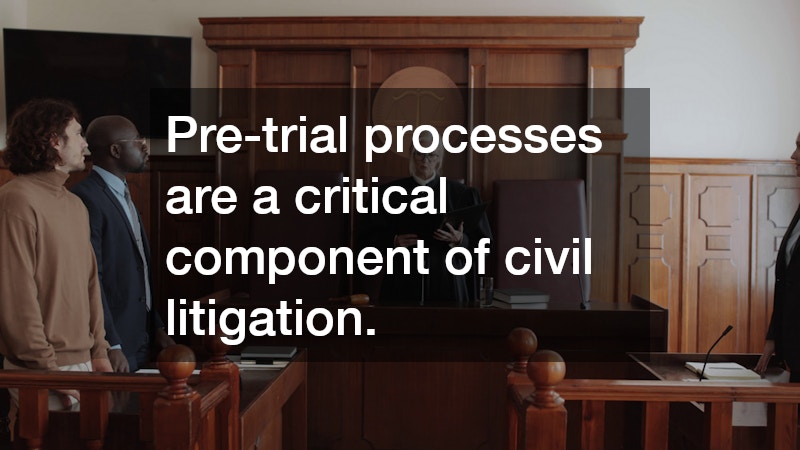How Civil Procedure Before Trials Shapes Case Outcomes
In the intricate landscape of legal proceedings, the stages that precede a trial can significantly influence the outcome of a case. Understanding how civil procedure operates before cases reach the courtroom is crucial for legal practitioners and parties involved. This article explores the pivotal roles of pre-trial processes, often referred to as civil procedure before trials, and their impact on case outcomes.
How Does the Discovery Process Influence Case Outcomes?
The discovery process is a cornerstone of pre-trial civil procedure, significantly affecting case outcomes by allowing both parties to obtain evidence from one another. This phase, which involves depositions, interrogatories, and requests for documents, enables each side to evaluate the strengths and weaknesses of their positions.
The information gleaned during discovery can lead to early settlements if one party realizes their case is weaker than initially believed.
The strategy employed during discovery can greatly shape the trajectory of a case. For instance, aggressive discovery tactics may pressure the opposing party into a settlement, while overly broad discovery requests can lead to disputes that may require court intervention. Efficient management of this process by legal practitioners is key to minimizing unnecessary conflict and ensuring that the parties are well-prepared for trial.
The impact of discovery extends beyond simply gathering evidence; it also allows for a clearer understanding of the factual landscape of a case. When effectively utilized, discovery can uncover critical evidence that supports a party’s claims or defenses, potentially leading to favorable pre-trial rulings, such as summary judgment. Ultimately, the discovery process is instrumental in shaping how civil cases proceed and in determining their outcome.
What Role Do Pre-Trial Motions Play in Shaping Case Outcomes?
Pre-trial motions are powerful tools in civil litigation, with the potential to drastically alter the course and outcome of a case before trial. Motions such as motions to dismiss or for summary judgment are designed to resolve a case or parts of a case without a full trial. These motions can streamline the focus of a trial or even eliminate the need for a trial altogether, should the court rule in favor of the moving party.
Motions in limine, another type of pre-trial motion, are used to exclude certain evidence from being presented during the trial. By limiting the evidence that can be shown to a jury, attorneys can influence the scope of what will be considered when deciding the case. Successful motions in limine can prevent prejudicial or irrelevant information from skewing the jury’s perception.
Why is the Pre-Trial Conference Important in Court Cases?
The pre-trial conference serves as a critical juncture in civil litigation, designed to simplify the issues and identify the procedures for the upcoming trial. This meeting involves the judge and attorneys from both sides and aims to ensure that the trial proceeds smoothly by resolving any outstanding procedural questions and setting definitive timelines for case progression.
During the pre-trial conference, parties often discuss the possibility of settlement, clarify issues to be addressed at trial, and agree on evidentiary and procedural matters. This ensures that neither side is taken by surprise at trial. By addressing potential hurdles beforehand, the pre-trial conference minimizes last-minute disputes and helps maintain focus on the substantive issues critical to the case outcome.
How Do Settlement Negotiations Affect Outcome of Civil Cases?
Settlement negotiations are a pivotal aspect of pre-trial procedures, often steering the case toward resolution without the need for a trial. These negotiations allow parties to reach a mutually satisfactory agreement, often resulting in cost savings, reduced litigation risk, and a guaranteed outcome compared to the uncertainties of a trial verdict.
The timing and approach to settlement negotiations are crucial. Early negotiations can sometimes reveal preferences and priorities of the opposing party, allowing for strategic positioning. Conversely, late-stage negotiations, after substantial evidence has been uncovered, might compel parties to reconsider their chances at trial and become more amenable to settlement.
What Effect Does Alternative Dispute Resolution Have on Case Outcomes?
Alternative Dispute Resolution (ADR) methods, such as mediation and arbitration, provide parties with avenues to resolve disputes outside of traditional courtroom settings. ADR serves as a pre-trial mechanism capable of influencing the outcome of civil cases by offering a more collaborative and less adversarial approach to resolving conflicts.
Mediation encourages cooperative problem-solving with the help of a neutral mediator who facilitates dialogue between the parties. This process often helps maintain relationships and leads to creative solutions that a court might not be able to provide. Mediation’s success lies in its ability to empower parties to mutually craft a resolution, thus having a positive effect on case outcomes by reducing the likelihood of further litigation.
Pre-trial processes are a critical component of civil litigation, profoundly impacting the direction and outcome of cases. By understanding and strategically navigating these processes, parties can better position themselves for favorable outcomes. As the landscape of legal proceedings continues to evolve, so too must the strategies employed during these formative stages.





Post Comment